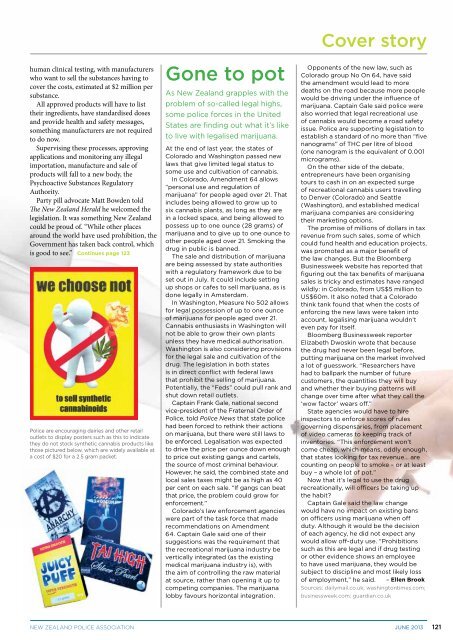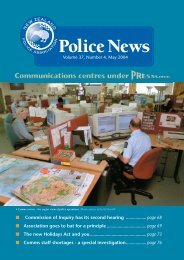FAKE dOPE REAl TROublE - New Zealand Police Association
FAKE dOPE REAl TROublE - New Zealand Police Association
FAKE dOPE REAl TROublE - New Zealand Police Association
Create successful ePaper yourself
Turn your PDF publications into a flip-book with our unique Google optimized e-Paper software.
human clinical testing, with manufacturerswho want to sell the substances having tocover the costs, estimated at $2 million persubstance.All approved products will have to listtheir ingredients, have standardised dosesand provide health and safety messages,something manufacturers are not requiredto do now.Supervising these processes, approvingapplications and monitoring any illegalimportation, manufacture and sale ofproducts will fall to a new body, thePsychoactive Substances RegulatoryAuthority.Party pill advocate Matt Bowden toldThe <strong>New</strong> <strong>Zealand</strong> Herald he welcomed thelegislation. It was something <strong>New</strong> <strong>Zealand</strong>could be proud of. “While other placesaround the world have used prohibition, theGovernment has taken back control, whichis good to see.” Continues page 123<strong>Police</strong> are encouraging dairies and other retailoutlets to display posters such as this to indicatethey do not stock synthetic cannabis products likethose pictured below, which are widely available ata cost of $20 for a 2.5 gram packet.Gone to potAs <strong>New</strong> <strong>Zealand</strong> grapples with theproblem of so-called legal highs,some police forces in the UnitedStates are finding out what it’s liketo live with legalised marijuana.At the end of last year, the states ofColorado and Washington passed newlaws that give limited legal status tosome use and cultivation of cannabis.In Colorado, Amendment 64 allows“personal use and regulation ofmarijuana” for people aged over 21. Thatincludes being allowed to grow up tosix cannabis plants, as long as they arein a locked space, and being allowed topossess up to one ounce (28 grams) ofmarijuana and to give up to one ounce toother people aged over 21. Smoking thedrug in public is banned.The sale and distribution of marijuanaare being assessed by state authoritieswith a regulatory framework due to beset out in July. It could include settingup shops or cafes to sell marijuana, as isdone legally in Amsterdam.In Washington, Measure No 502 allowsfor legal possession of up to one ounceof marijuana for people aged over 21.Cannabis enthusiasts in Washington willnot be able to grow their own plantsunless they have medical authorisation.Washington is also considering provisionsfor the legal sale and cultivation of thedrug. The legislation in both statesis in direct conflict with federal lawsthat prohibit the selling of marijuana.Potentially, the “Feds” could pull rank andshut down retail outlets.Captain Frank Gale, national secondvice-president of the Fraternal Order of<strong>Police</strong>, told <strong>Police</strong> <strong>New</strong>s that state policehad been forced to rethink their actionson marijuana, but there were still laws tobe enforced. Legalisation was expectedto drive the price per ounce down enoughto price out existing gangs and cartels,the source of most criminal behaviour.However, he said, the combined state andlocal sales taxes might be as high as 40per cent on each sale. “If gangs can beatthat price, the problem could grow forenforcement.”Colorado’s law enforcement agencieswere part of the task force that maderecommendations on Amendment64. Captain Gale said one of theirsuggestions was the requirement thatthe recreational marijuana industry bevertically integrated (as the existingmedical marijuana industry is), withthe aim of controlling the raw materialat source, rather than opening it up tocompeting companies. The marijuanalobby favours horizontal integration.Cover storyOpponents of the new law, such asColorado group No On 64, have saidthe amendment would lead to moredeaths on the road because more peoplewould be driving under the influence ofmarijuana. Captain Gale said police werealso worried that legal recreational useof cannabis would become a road safetyissue. <strong>Police</strong> are supporting legislation toestablish a standard of no more than “fivenanograms” of THC per litre of blood(one nanogram is the equivalent of 0.001micrograms).On the other side of the debate,entrepreneurs have been organisingtours to cash in on an expected surgeof recreational cannabis users travellingto Denver (Colorado) and Seattle(Washington), and established medicalmarijuana companies are consideringtheir marketing options.The promise of millions of dollars in taxrevenue from such sales, some of whichcould fund health and education projects,was promoted as a major benefit ofthe law changes. But the BloombergBusinessweek website has reported thatfiguring out the tax benefits of marijuanasales is tricky and estimates have rangedwildly: in Colorado, from US$5 million toUS$60m. It also noted that a Coloradothink tank found that when the costs ofenforcing the new laws were taken intoaccount, legalising marijuana wouldn’teven pay for itself.Bloomberg Businessweek reporterElizabeth Dwoskin wrote that becausethe drug had never been legal before,putting marijuana on the market involveda lot of guesswork. “Researchers havehad to ballpark the number of futurecustomers, the quantities they will buyand whether their buying patterns willchange over time after what they call the‘wow factor’ wears off.”State agencies would have to hireinspectors to enforce scores of rulesgoverning dispensaries, from placementof video cameras to keeping track ofinventories. “This enforcement won’tcome cheap, which means, oddly enough,that states looking for tax revenue… arecounting on people to smoke – or at leastbuy – a whole lot of pot.”Now that it’s legal to use the drugrecreationally, will officers be taking upthe habit?Captain Gale said the law changewould have no impact on existing banson officers using marijuana when offduty. Although it would be the decisionof each agency, he did not expect anywould allow off-duty use. “Prohibitionssuch as this are legal and if drug testingor other evidence shows an employeeto have used marijuana, they would besubject to discipline and most likely lossof employment,” he said. – Ellen BrookSources: dailymail.co.uk; washingtontimes.com;businessweek.com; guardian.co.uknew zealand police aSSOCIATION june 2013 121
















